

Jane McAlevey: We Can't Labor Without Our Lives [FULL VIDEO] Searching for the Union.pdf. It's About Power Stupid! A forum for discussing labor issues sponsored by the DSA Labor Network. 99 Pickets: NYC Worker Solidarity. Hospital giant fails in bid to swipe nurses’ sick days. One of the country’s largest and most profitable hospital chains has been defeated in its effort to take away its nurses’ sick days, according to the union that mounted nine strikes there over the past two years.
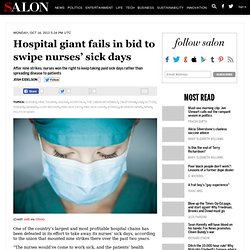
“The nurses would’ve come to work sick, and the patients’ health would’ve declined,” said California Nurses Association Executive Director RoseAnn DeMoro. “Because the nurses would be exposing current patients to the past patients’ illnesses.” While nurses “take the risk of being around very sick people,” DeMoro told Salon, they “are not super-women.” According to CNA, eliminating paid sick days was one of nearly 200 concessions sought by California healthcare giant Sutter Health, in negotiations over union contracts covering 3,000 nurses and hundreds of other employees at central California hospitals. Others included eliminating health coverage for nurses who work less than 30 hours a week, and reducing — to 6 hours — nurses’ minimum time off between shifts. Garment workers held boss captive until he paid promised bonus. Labor Notes. Jane McAlevey. Can't Survive on the Taxpayer Dime: Fast Food Workers Strike Back.
Labor Notes. Viewpoint: AFL-CIO Convention Repositions Unions to Speak for All Workers. The AFL-CIO Convention in September took an important turn to reposition unions toward speaking for all working people in the United States.
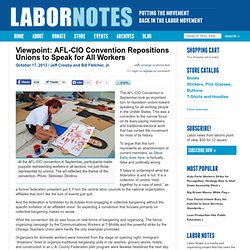
This was a correction to the narrow focus on its dues-paying members and traditional electoral work that has cursed the movement for most of its history. To argue that this turn represents an abandonment of current members, as Steve Early does here, is factually false and politically wrong. It helps to understand what the federation is and is not. It is a collection of unions “held together by a rope of sand,” as a former federation president put it. Breaking: Wal-Mart workers on strike, defying firings.
Dozens of workers at a Florida Wal-Mart walked off the job this morning, mounting the first Wal-Mart store work stoppage since the firings of 20 workers who participated in an extended June strike.
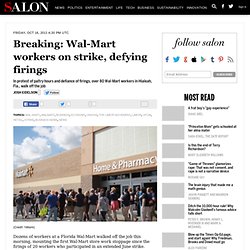
“I don’t have fear,” striker Jose Bello told Salon in Spanish. “I don’t have any fear. They could punish us – we’re used to that.” Bello said that at least 80 of the employees at his Hialeah, Fla., store had joined the strike, which began at 9 a.m. Wal-Mart did not immediately respond to a request for comment. Bangladesh garment workers stage biggest wage hike protest. BANGLADESH Thousands of garment workers stop Bangladesh, demanding higher wages. » 09/23/2013 14:16BANGLADESHThousands of garment workers stop Bangladesh, demanding higher wagesby Sumon CorrayaFor the past three days, garment workers have been on strike to demand a minimum monthly salary of 8,000 taka (US$ 100).

"With the 3,000 taka (US$ 40) that I take now, I cannot [. . .] buy medicine for my mother," a young worker said. Labor is Not a Commodity. By Bjorn Skorpen Claeson, International Labor Rights Forum Today, the New York Times reports child labor, blocked fire exits, unsafe buildings, forced overtime and a range of other illegal, unsafe, and abusive conditions for garment workers in factories in Bangladesh, Cambodia, Haiti, Mexico, and Thailand.
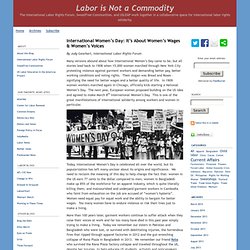
These factories have at least one thing in common: the United States government is a customer. That means these abuses take place with the support of our tax dollars and are carried out in our names. It also means the Obama administration “flouts its own advice” to private sector companies to use their purchasing power to improve working conditions in overseas garment factories. Because the U.S. government is the world’s single largest buyer it could create a significant push for safe and decent working conditions in supplier factories across the globe by practicing what it preaches.
Here are 10 steps the U.S. government should take to be a responsible consumer: Workers in Cambodia Take to the Streets to Demand Higher Wages - Labor is Not a Commodity. By Diana Karakos, Intern, International Labor Rights Forum Something amazing has happened this week.
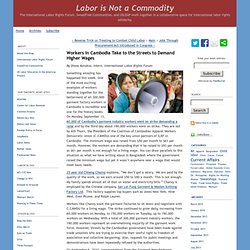
One of the most exciting examples of workers standing together for the betterment of all 300,000 garment factory workers in Cambodia is incredible and one for the history books. On Monday, September 13, 60,000 of Cambodia’s garment industry workers went on strike demanding a raise and by the third day about 190,000 workers were on strike. They are led by Ath Thorn, the President of the Coalition of Cambodian Apparel Workers Democratic Union (C.CAWDU) one of the key union partners of ILRF in Cambodia. The minimum wage was raised from $50 per month to $61 per month. 25 year old Chheng Chanvy explains, “We don’t get a salary. Workers’ protest forces shutdown of Dhaka garment units. Authorities in Bangladesh on Saturday ordered temporary shutdown of nearly 300 garment factories as several thousand workers took to the streets demanding higher wages.
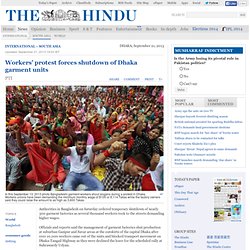
The Impact and Echoes of the Wal-Mart Discrimination Case. Betty Dukes talks to the press on the steps of the U.S.

Supreme Court after the class action lawsuit Dukes v. Wal-Mart was argued before the court in Washington, March 29, 2011 (Photo: Reuters) Two years later, it’s becoming clear just how much the ruling has reshaped the American legal landscape. The Dukes decision has already been cited more than 1,200 times in rulings by federal and state courts, a figure seen by experts as remarkable. Jury verdicts have been overturned, settlements thrown out, and class actions rejected or decertified, in many instances undoing years of litigation. Fast-food workers strike for higher pay. 1 of 11 Autoplay Show Thumbnails Show Captions Workers at McDonald's and other fast-food chains conducted strikes and walkouts in nearly 60 cities Thursday, hoping for super-size wage hikes that for many would boost their hourly pay to $15 from the current federal minimum $7.25.
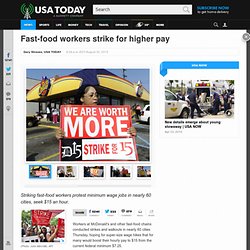
The pre-Labor Day protests, which follow a series of strikes that began last November in New York City. targeted fast-food chains including McDonald's, Burger King, Wendy's and Yum Brands, whose chains include KFC and Taco Bell. Strike organizers, a loose confederation of local community groups and churches which has received some financial and training support from the Service Employees International Union, say restaurants in Milwaukee, Detroit and St. Related: Low-wage workers falling behind New York, City Council Speaker Christine Quinn joined about 300 to 400 workers and supporters Thursday in a march before the group flooded into a McDonald's near the Empire State Building. Amazon Workers In Germany Strike For Higher Wages (PHOTOS) Labor is Not a Commodity. Labor unions in the United States.
Most unions in the United States are aligned with one of two larger umbrella organizations: the AFL-CIO created in 1955, and the Change to Win Federation which split from the AFL-CIO in 2005.
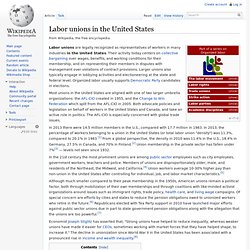
Both advocate policies and legislation on behalf of workers in the United States and Canada, and take an active role in politics. The AFL-CIO is especially concerned with global trade issues. In 2013 there were 14.5 million members in the U.S., compared with 17.7 million in 1983. In 2013, the percentage of workers belonging to a union in the United States (or total labor union "density") was 11.3%, compared to 20.1% in 1983.[1] From a global perspective, the density in 2010 was 11.4% in the U.S., 18.4% in Germany, 27.5% in Canada, and 70% in Finland.[2] Union membership in the private sector has fallen under 7%[3] — levels not seen since 1932.
In the 21st century the most prominent unions are among public sector employees such as city employees, government workers, teachers and police. History[edit] Industrial Workers of the World. The Industrial Workers of the World (IWW), commonly known as the Wobblies, is an international revolutionary industrial labor organization that was formed in 1905.